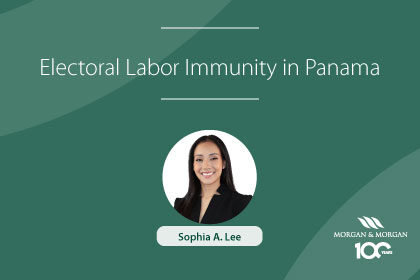
Electoral labor immunity in Panama is a matter of crucial importance for both employers and employees, to ensure fairness and democratic participation in the electoral process, especially for those employees who decide to run as candidates or are elected to public office.
Electoral labor immunity is the guarantee and protection that candidates and electoral delegates have against dismissal, transfers, suspension, or worsening of their labor conditions without prior authorization from the Electoral Tribunal (in the case of public servants) or the labor jurisdiction (in the case of private companies) based on a justified cause.
This immunity, which should not be confused with electoral leave, is a fundamental right that protects employees during the period in which they engage in political activities, thus avoiding possible retaliation from their employers.
In Panama, electoral labor immunity is regulated by the Electoral Code, Chapter III. This regulation establishes that such immunity will be valid in the following cases:
- For candidates for popularly elected positions or positions within party organs: from the moment their nomination becomes firm in the respective electoral process until 60 days after the delivery of credentials. When it comes to candidates aspiring to a candidacy by independent nomination, it will be from the moment the resolution of the Electoral Tribunal authorizing the start of the signature collection process becomes final until the respective proclamation becomes final.
- For electoral delegates: from the opening of the respective electoral process until fifteen days after the finality of the last proclamation.
It is important to note that the fact that an employee has this immunity does not mean that the employment relationship cannot be terminated by dismissal. The company must request prior authorization from the Sectional Labor Courts.
In the event of dismissal, transfer, suspension, or worsening of labor conditions, the protected employee will have a period of fifteen business days following the adverse measure to present to their employer the certification or other suitable document accrediting the immunity. If the protected person does not prove their condition within the specified period, they lose the immunity.
Electoral labor immunity goes hand in hand with what is established by the Labor Code, Article 128, numeral 16. According to this regulation, workers who decide to participate as candidates in an election have the right to request unpaid leave for the performance of a public commission or office for a term of no less than six months and no more than two years, retaining the right to reinstatement within the fixed term, with all the rights derived from their respective contracts. In cases of publicly elected positions, the leave will be for the term of the position.
This leave allows elected workers to dedicate themselves exclusively to their political activities without affecting their job stability, since once the period for which they were elected ends, they have the right to be reinstated to their position under the same conditions they had prior to the start of the leave.
The importance of electoral labor immunity lies in guaranteeing the free political participation of workers, without having to face possible reprisals or discrimination from their employers.
This immunity contributes to strengthening the democratic system by promoting greater representativeness and diversity in governing bodies. By providing workers from different sectors and professions with the opportunity to participate in the political life of the country, public debate is enriched, and greater inclusion in decision-making is promoted.
The Electoral Code is categorical in sanctioning severely those individuals who “material or intellectual authors” dismiss, transfer, or in any way worsen the position or job of any person protected by electoral labor immunity, whether public or private. The sanction consists of imprisonment from 1 to 3 years as it considers these actions as electoral crimes. Therefore, companies wishing to terminate an employee who has this type of immunity must seek proper advice.
However, it is essential to ensure that electoral labor immunity does not become an obstacle to the proper functioning of companies and organizations, especially in critical sectors such as private companies, health, or education. Therefore, it is important to find a balance between the rights of workers and the operational needs of companies by implementing flexible measures adapted to different labor realities.
Author: Sophia Lee, Senior Associate, [email protected]
For more information on these topics, please contact our Labor Department, [email protected]

